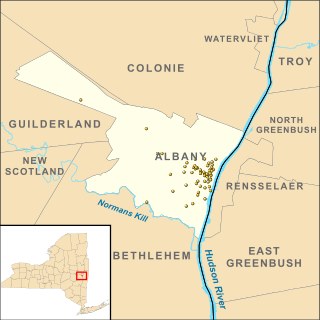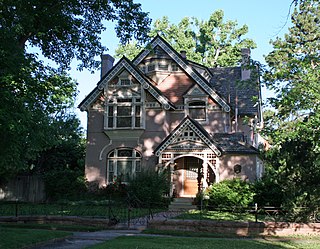
St. Marys is a city in Elk County, Pennsylvania, United States. The population is 12,429 as of 2019. Originally a small town inhabited by mostly Bavarian Roman Catholics, it was founded December 8, 1842. It is home to Straub Brewery and the first Benedictine convent in the United States. In 1992, the borough of St. Marys absorbed the surrounding township of Benzinger and incorporated as a city. Despite its place as the second-largest city by area in Pennsylvania behind Philadelphia, its low population leads to it being one of the state's least dense cities.

Adolphus Busch was the German-born co-founder of Anheuser-Busch with his father-in-law, Eberhard Anheuser. He introduced numerous innovations, building the success of the company in the late 19th and early 20th centuries. He became a philanthropist, using some of his wealth for education and humanitarian needs. His great-great-grandson, August Busch IV, is a former CEO of Anheuser-Busch.

Brewerytown is a neighborhood in the North Philadelphia section of Philadelphia, Pennsylvania, United States. An unofficial region, Brewerytown runs approximately between the Schuylkill River's eastern bank and 25th Street, bounded by Cecil B. Moore Avenue to the north and Parrish Street to the south. Brewerytown got its name because of the numerous breweries that were located along the Schuylkill during the late 19th century and early 20th century. It is now primarily a residential neighborhood, with a growing and active commercial sector along Girard Avenue.

Westside is a Syracuse, New York neighborhood, directly west of Downtown Syracuse. It corresponds to Onondaga County Census Tracts 21 and 22. It is made up of three parts, near West side, far west side and the West side

Monument Hill and Kreische Brewery State Historic Sites is a historic state park located at 29.888° -96.876°, just off U.S. Route 77, south of La Grange, Texas. The park sits on a sandstone bluff above the Colorado River. Monument Hill is a crypt and memorial to the men who died in the Dawson Massacre and in the Black Bean Episode of the ill-fated Mier Expedition.

Anheuser-Busch Brewery is a brewery complex in St. Louis, Missouri.

Creagerstown is an unincorporated community in Frederick County, Maryland, United States. It is playfully known by its residents as "4 miles from everywhere" because of its situation at 4 miles (6.4 km) from Thurmont, Woodsboro, Rocky Ridge, and Lewistown.

The Chicago, Milwaukee, St. Paul and Pacific Freight House, known locally as The Freight House, is a historic building in Downtown Davenport, Iowa, United States. It was listed on the National Register of Historic Places in 1985.

Washington Avenue Historic District is the historic center of Cedarburg, Wisconsin, the location of the early industry and commerce that was key to the community's development. The historic district was listed on the National Register of Historic Places (NRHP) in 1986.

There are 73 properties listed on the National Register of Historic Places in Albany, New York, United States. Six are additionally designated as National Historic Landmarks (NHLs), the most of any city in the state after New York City. Another 14 are historic districts, for which 20 of the listings are also contributing properties. Two properties, both buildings, that had been listed in the past but have since been demolished have been delisted; one building that is also no longer extant remains listed.

The Quinnipiac Brewery, also known as Brewery Square, is a complex of brick buildings at 19-23 River Street in the Fair Haven neighborhood of New Haven, Connecticut. Developed beginning in 1892 and operative until the 1930s, the complex is a rare example of a late 19th-century large-scale brewery. The complex was listed on the National Register of Historic Places in 1983. Most of the complex is now residences.

The Frederick W. Neef House is a house in Denver, Colorado, United States that was built in 1886 and is listed on the U.S. National Register of Historic Places.

The Henry Klindt House is a historic building located in the West End of Davenport, Iowa, United States. It has been listed on the National Register of Historic Places since 1984.

Bavarian Brewing Company was a brewery established in Covington, Kentucky, in 1866 by Julius Deglow, but became known as the Bavarian Brewery around 1870. The brewery was originally located on Pike Street, but expanded to 12th Street within a decade. After John Meyer acquired the brewery in 1881, he sold an interest to William Riedlin in 1882. The company operated under the proprietorship of Meyer & Riedlin starting in 1884, before becoming incorporated as the Bavarian Brewery Co. in 1889 by William Riedlin. The company was family owned until it was acquired by International Breweries, Inc.(IBI) in 1959. However, it operated as the Bavarian Division of IBI and continued to produce its flagship beer, Bavarian's, until the facility closed in 1966. The property was placed on the National Register of Historic Places and renovated as a multipurpose complex for food, beverage and entertainment uses in 1996. It operated as the Brew Works at the Party Source and Jillian's, but closed in 2006. The former structure containing the Brew and Mill Houses, built in 1911, was repurposed into office space becoming part of the Kenton County Government Center, opening in 2019. This office complex has a Bavarian Brewery Exhibit and it is accompanied by a Bavarian Brewery website.

Mission Brewery Plaza is a historic brewery building in the Middletown neighborhood of San Diego, California. The building was added to the National Register of Historic Places on July 6, 1989. It is also the name of a San Diego microbrewery which opened in 2007.

The Gundlach-Grosse House is a historic house located at 625 N. Main St. in Columbia, Illinois. The Greek Revival house was built in 1857 for German immigrants John and Philip Peter Gundlach. The brothers ran a local brewery which remained in their family for four generations, and John Gundlach served as Columbia's mayor for four years. The house is a 1 ½-story brick building; its corbeled brick frieze is representative of the decorative brickwork commonly designed by German immigrant builders. The entrance to the house features a classical pediment supported by Ionic columns and cast iron pilasters. Two windows with broken scroll pedimented lintels are situated on each side of the door. The house's gable roof features three gabled dormers on the front and back sides.

The Alton Military Prison was a prison located in Alton, Illinois and originally built in 1833 as the first state penitentiary in Illinois and later closed in 1857. During the American Civil War, the prison was reopened in 1862 to accommodate the growing population of Confederate prisoners of war and ceased to be prison at the end of the war in 1865. The prison building was demolished not long after the Civil War. All that remains of the former prison site is a section of ruin wall that is maintained by the State of Illinois as an historic site. The prison site is included in the U.S. National Register of Historic Places.

The Old Lone Star Brewery complex is located at 200 West Jones Avenue, downtown San Antonio, county of Bexar, in the U.S. state of Texas. It was added to the National Register of Historic Places in 1972.

Muessel-Drewry Brewery is a historic brewery complex and National historic district located off the crossroads of Portage Road and Elwood Avenue in South Bend, St. Joseph County, Indiana. It originally encompassed seven contributing buildings and two contributing structures, listed as a series of grain silos as one structure and a smoke stack as the other. It developed between about 1865 and 1949, and consists of a mix of industrial buildings that are made of period brick from their respective era, as well as pole barn outbuildings and a series of grain silos and a large smoke stack. The buildings are associated with Christopher Muessel, a German immigrant, who was known for his forward thought in developing brewing technology and processes, and what later became Muessel Brewing Company, ran by Muessel's kin upon his passing until going out of business in 1933 as a product of not being able to survive as a non-alcoholic beverage company in the prohibition era in the United States. The Muessel family was a significant contributor to the growth of what is now known as District 2 in South Bend. In addition to the hundreds of homes that provided housing for staff, the family also contributed the largest park in the area, as well as a local school, both of which are still in existence today, Muessel Grove Park and Muessel Elementary School. The family also was a local sponsor of South Bend's professional football team, the Muessel Brewers, which was coach by football legend and local hero Knute Rockne to an undefeated season while Rockne had an all-star senior year as Captain of the Football team at neighboring University of Notre Dame.
Union Brewery may refer to:





















